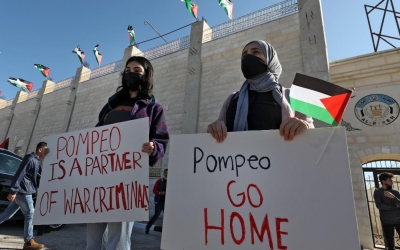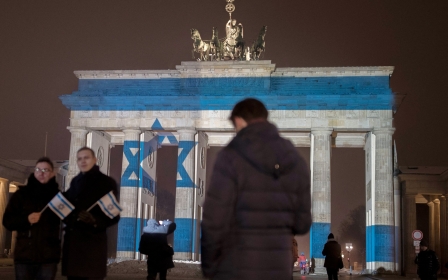Progressive Jewish groups oppose codifying IHRA antisemitism definition into US law

Almost a dozen pro-Israel Jewish groups have denounced efforts to codify into US law a controversial definition of antisemitism, arguing that doing so would "suppress legitimate free speech".
In a statement on Tuesday, the Progressive Israel Network, an umbrella group for ten organisations "that care deeply about the State of Israel", called on federal, state and university authorities to refrain from adopting the International Holocaust Remembrance Alliance's (IHRA) definition of antisemitism.
New MEE newsletter: Jerusalem Dispatch
Sign up to get the latest insights and analysis on Israel-Palestine, alongside Turkey Unpacked and other MEE newsletters
The groups included Americans for Peace Now, J Street and the New Israel Fund, among others.
The IHRA definition that the groups spoke out against contains 11 "contemporary examples of antisemitism", such as denying the Holocaust and promoting conspiracy theories about the Jewish people.
But other more controversial examples given include "applying double standards" to Israel, describing the creation of Israel as a "racist endeavor", and comparing the Israeli government's actions with the Nazis.
'Abuse and politicisation'
The definition has been used to label the Boycott, Divestment and Sanctions (BDS) movement as antisemitic. The Palestinian-led BDS movement, founded in 2005, is an international anti-Zionist effort that urges states, individuals and institutions to economically pressure Israel over its well-documented human rights abuses. The movement has become particularly popular on university campuses.
In Tuesday's statement, the groups warned that instead of combating antisemitism, the IHRA definition "is being misused and exploited to instead suppress legitimate free speech, criticism of Israeli government actions, and advocacy for Palestinian rights".
"This effort has created opportunities for abuse and politicization by the outgoing Trump administration and others, undermining the moral clarity of the effort to dismantle antisemitism," the groups said.
"We fear its adoption in law or policy at the state, federal, and university level and in corporate governance has the potential to undermine core freedoms, and in some cases already has."
US President Donald Trump issued a "non legally binding" executive order that declared antisemitism to be legally prohibited under Title VI of the Civil Rights Act of 1964 and called on executive departments to use the IHRA definition and its examples to determine discrimination.
Tennessee, South Carolina and Maine have already advanced legislation that would codify the IHRA definition into state law, and several probes by the US Department of Education against potentially "antisemitic incidents" have been launched since Trump's order.
Criminalising BDS
In November, US Secretary of State Mike Pompeo issued a statement that claimed anti-Zionism is the same as antisemitism. Anti-Zionism is a movement against an ideology that says Israel is an inherently Jewish state for only the Jewish people.
In his statement, Pompeo said the US was, therefore, "committed to countering the Global BDS Campaign as a manifestation of anti-Semitism".

In their statement on Tuesday, the pro-Israeli groups called Pompeo's statements against BDS "a harmful overreach".
"This overreach, which is primarily aimed at shielding the present Israeli government and its occupation from all criticism, is made possible by the use of the Working Definition’s 'contemporary examples,'" the statement reads.
The groups slammed the State Department's proposition to blacklist non-violent activists and human rights organisations "who are targeted simply because they document abuses or oppose the Israeli occupation of Palestinian territory".
The Progressive Israel Network's condemnation of the IHRA definition joins others that have been declared by dozens of Jewish groups worldwide and by hundreds of leading Jewish and Israeli scholars.
In 2019, Kenneth Stern, one of the antisemitism experts who drafted the original IHRA definition, wrote that it was never intended to be used as a sweeping, all-purpose hate speech code and that its use as such by the Trump administration and rightwing Jewish groups "is an attack on academic freedom and free speech".
Middle East Eye delivers independent and unrivalled coverage and analysis of the Middle East, North Africa and beyond. To learn more about republishing this content and the associated fees, please fill out this form. More about MEE can be found here.






